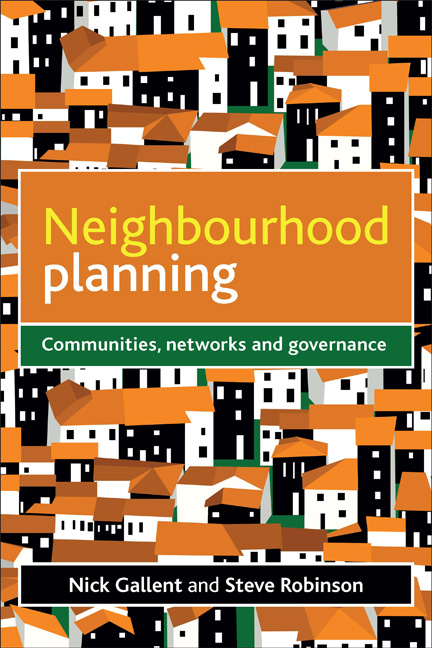Book contents
- Frontmatter
- Dedication
- Contents
- List of figures, images and table
- Abbreviations
- Acknowledgements
- Authors’ note
- Part One Democracy, planning and localism
- Part Two Capacity building and community-based planning
- Part Three The interface with policy actors
- Part Four Neighbourhood planning, leadership and democratic renewal
- References
- Index
two - Democratic renewal, planning and housing growth in England
Published online by Cambridge University Press: 07 September 2022
- Frontmatter
- Dedication
- Contents
- List of figures, images and table
- Abbreviations
- Acknowledgements
- Authors’ note
- Part One Democracy, planning and localism
- Part Two Capacity building and community-based planning
- Part Three The interface with policy actors
- Part Four Neighbourhood planning, leadership and democratic renewal
- References
- Index
Summary
The political and policy framework in which local government operates, and which determines its relationship with key policy actors and with community and interest groups, has been heavily amended over the last 15 years. Successive Labour governments from 1997 drove forward a programme of state modernisation and local government reform that appeared to challenge executive forms of ‘top-down’ control, by centralised departments and agencies, giving momentum instead to collaborative and participative forms of ‘governance’, characterised by bottom-up input into decision-making processes by a range of local actors from across the public, private and voluntary sectors. Labour's reform programme, carried forward in several pieces of major legislation, sought to respond to an undercurrent of frustration with the failed politics of the 1980s and 1990s, which seemed locked within a model of executive, centralised power. The New Labour project from 1997 onwards was one of devolution of responsibility for decision making away from the centre, to new political structures in the Home Nations and the English regions and to existing local state apparatus, albeit revamped, modernised and better connected to broader community interests. The passing of responsibility further down the ‘chain of command’ to community governance structures, later dubbed ‘communities in control’, was famously claimed as evidence of government's commitment to ‘double devolution’ (Mulgan and Bury, 2006).
The legislation designed to realise a ‘governance shift’ in the UK, and specifically in England, is reviewed later in this chapter. But before dealing with the detail of local government reform, and contrasting its objectives with those of systemic changes to planning, it is useful to explore the roots of this process. All British governments, including the current coalition government, have during the period outlined above, appeared to concede power to the local state and to communities. Power has seemingly bled from the public to the private realm, bringing those who were previously governed into the process of government. There is, of course, a broader debate as to whether power has in fact relocated, or whether the emergent apparatus of collaborative governance is designed simply to appease local populations without bringing any genuine change. This question is examined through the lens of neighbourhood planning in England, but here we begin with a focus on the drivers of democratic and functional renewal, rooted in what has been viewed as a ‘disaggregation’ of state and society, ongoing in Western democracies for at least the past three decades.
- Type
- Chapter
- Information
- Neighbourhood PlanningCommunities, Networks and Governance, pp. 9 - 22Publisher: Bristol University PressPrint publication year: 2012



